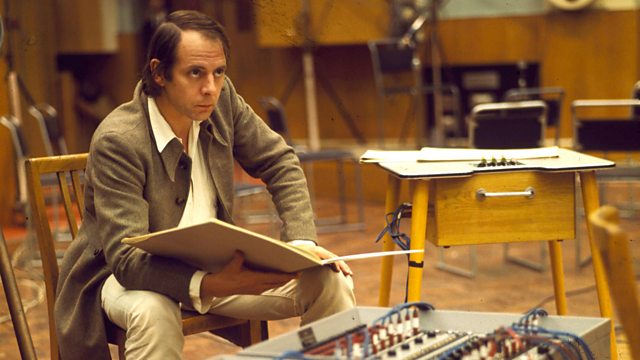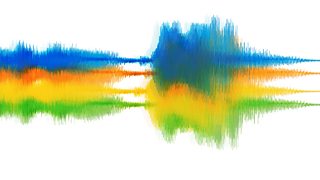
Adventures in Electronica
Donald Macleod and Robert Worby discuss the period after Stockhausen studied in Paris, when he took a post in the electronic studio at Cologne Radio Station.
New Year New Music
Stockhausen breaks new ground in the field of electronic music synthesis.
Karlheinz Stockhausen's formative experiences growing up in Nazi Germany show up in his later music. His preoccupation with flight, mechanical mechanisms and the cause and effect of different sounds can all be traced back to his earliest childhood memories. Born in 1928 into a Catholic family, his father, Simon, was a primary school teacher and his mother, Gertrud came from a wealthy farming family. The family lived in some poverty, but his mother had a musical leaning, playing the piano and singing, while his father enjoyed amateur dramatics. Family life was disrupted when his mother needed to be hospitalised for the treatment of her depression. Thereafter family life for Stockhausen was unsettled. His father went to the front as an officer in 1943 and was presumed dead at the end of the war. In 1941, it's thought that Stockhausen's mother had been a victim of Hitler's "euthanasia policy". Now an orphan, in a devastated, war torn country, a 16 year old Stockhausen dedicated himself to surviving and studying, eventually gaining a place at the music school in Cologne. It was to be the platform on which his career as a composer was launched.
After studying in Paris with Messiaen, Stockhausen took a post in the electronic studio at Cologne Radio Station. His work in the field of electronic music far surpassed anything that the studio had created before. Composer, writer and broadcast Robert Worby joins Donald Macleod to discuss why Stockhausen believed electronic music held the key to the future and that in twenty years no-one would be listening to Bach anymore.
Klavierstück no. 5
Herbert Henck, piano
Gesang der Jünglinge
Karlheinz Stockhausen
Refrain for piano, celeste and percussion
Ensemble Recherche
Adieu
Sebastian Bell, flute
Janet Craxton, oboe
John Butterworth, horn
William Waterhouse, bassoon
Antony Pay, clarinet
Karlheinz Stockhausen, conductor.
Last on
Music Played
-
![]()
Karlheinz Stockhausen
Klavierstuck no. 5
Performer: Herbert Henck.- WER: 60135/36-50.
- WER.
- 5.
-
![]()
Karlheinz Stockhausen
Gesang Der Junglinge No.8 For Tape
- STOCKHAUSEN : CD-3.
- STOCKHAUSEN.
- 4.
-
![]()
Karlheinz Stockhausen
Refrain
Ensemble: ensemble recherche.- Wergo: WER 67172.
- Wergo.
- 2.
-
![]()
Karlheinz Stockhausen
Adieu
Orchestra: London Sinfonietta. Conductor: Karlheinz Stockhausen.- STOCKHAUSEN : STOCHAUSEN-4.
- STOCKHAUSEN.
- 23.
Broadcasts
- Wed 6 Jan 2016 12:00����ý Radio 3
- Wed 6 Jan 2016 18:30����ý Radio 3
New Year New Music - Highlights
Beethoven Unleashed – the box set
What was really wrong with Beethoven?
Composers A to Z
Who knew? Five eye-opening stories from Composer of the Week
Five reasons why we love Parry's Jerusalem
What is the strange power of Jerusalem which makes strong men weep?
A man out of time – why Parry's music and ideas were at odds with his image...
The composer of Jerusalem was very far from the conservative figure his image suggests.
Composer Help Page
Find resources and contacts for composers from within the classical music industry.






